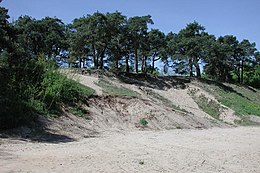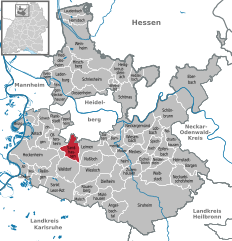Sandhausen
Sandhausen | |
|---|---|
 Old town hall | |
 Coat of arms | |
show Location of Sandhausen within Rhein-Neckar-Kreis district | |
 Sandhausen | |
| Coordinates: 49°20′38″N 08°39′29″E / 49.34389°N 8.65806°ECoordinates: 49°20′38″N 08°39′29″E / 49.34389°N 8.65806°E | |
| Country | Germany |
| State | Baden-Württemberg |
| Admin. region | Karlsruhe |
| District | Rhein-Neckar-Kreis |
| Government | |
| • Mayor | Georg Kletti (CDU) |
| Area | |
| • Total | 14.55 km2 (5.62 sq mi) |
| Elevation | 107 m (351 ft) |
| Population (2020-12-31)[1] | |
| • Total | 15,339 |
| • Density | 1,100/km2 (2,700/sq mi) |
| Time zone | UTC+01:00 (CET) |
| • Summer (DST) | UTC+02:00 (CEST) |
| Postal codes | 69207 |
| Dialling codes | 06224 |
| Vehicle registration | HD |
| Website | www.sandhausen.de |
Sandhausen (German pronunciation: [zantˈhaʊ̯zn̩]) is a municipality in the district of Rhein-Neckar-Kreis, in Baden-Württemberg, Germany. It is situated 7 km south of Heidelberg.
Geography[]
Location[]
Sandhausen belongs to the Rhein-Neckar Metropolitan region. It is known for its sand dune.
History[]

The first recorded mention of Sandhausen (or "Santhusen") was in 1262. Sandhausen is named after the ice-age sand dunes that border the municipality. As early as Roman times, a settlement called "Lochheim" existed in the area.
It was part of Bishopric of Speyer till 1262, when Otto von Bruchsal gave it to Ludwig II, Electoral Palatin. It was part of Oberamt Heidelberg in 1351. It was sacked by Baden and Württemberg troops at Mainz Diocesan Feud in 1462.
It was again sacked by Spanish troops at Thirty Years' War in 1622 and by French ones at Nine Years' War in 1688. French ones remained in Sandhausen till 1697. After dying Bavarian branch of House of Wittelsbach with death of Maximilian III, Elector of Bavaria, Charles Theodore, County Palatine of Rhine inherited Bavaria in 1777 and territories of House of Wittelsbach were united under Palatinate branch of her.
Thus, Sandhausen became part of Bavaria. It was occupied by French troops in 1795 and was awarded to Grand Duchy of Baden after German mediatization in 1803.
Politics[]
Municipal Council[]
| Municipal Council 2014[2] | |||||
| Party | Votes | Seats | |||
| CDU | 38.6 % | 8 | |||
| SPD | 30.4 % | 7 | |||
| FDP | 17.3 % | 4 | |||
| Greens | 13.7 % | 3 | |||
| Voter Participation: 49.5% | |||||
Mayor[]
The mayor of Sandhausen is Georg Kletti (CDU). Previous mayors were as follows:
- 1954–1981: Walter Reinhard
- 1981–2005: Erich Bertsch
Sister cities[]
 Lège-Cap-Ferret, France, since 1980
Lège-Cap-Ferret, France, since 1980
Economy and infrastructure[]
Economy[]
In the past, hops were grown in Sandhausen. The tobacco industry, which thrived in Sandhausen in the past, is now restricted to the rural parish of Bruchhausen.
Transportation[]
Schools[]
Sandhausen has the following schools:
- Theodor Heuss primary school
- Friedrich-Ebert-Hauptschule with Werkrealschule
- Friedrich-Ebert-Gymnasium
- Pestalozzi-Förderschule
- Music school ("Südliche Bergstraße")
Sport[]
The football club SV Sandhausen plays in the Hardtwaldstadion on the outskirts of the town. The club counts as the smallest professional football club in Germany playing the second division of the German league since the 2012–13 season.
Notable people[]
- Markus Friedrich Wendelin (born 1584 in Sandhausen), theologian and educator
References[]
- ^ "Bevölkerung nach Nationalität und Geschlecht am 31. Dezember 2020". Statistisches Landesamt Baden-Württemberg (in German). June 2021.
- ^ "Results of the Municipal Council elections in 2014" (PDF), Official website of Sandhausen (in German)
External links[]
- Official website
 (in German)
(in German)
- Municipalities in Baden-Württemberg
- Rhein-Neckar-Kreis
- Karlsruhe region geography stubs



